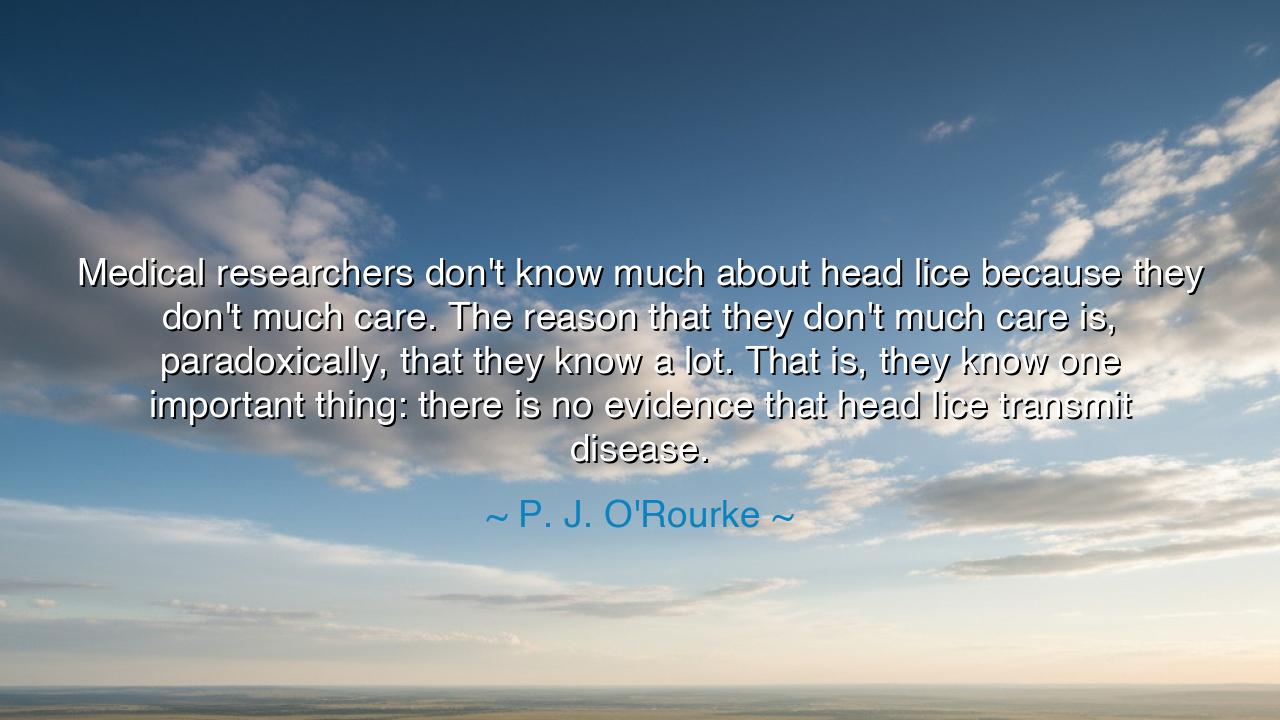
Medical researchers don't know much about head lice because they
Medical researchers don't know much about head lice because they don't much care. The reason that they don't much care is, paradoxically, that they know a lot. That is, they know one important thing: there is no evidence that head lice transmit disease.






When P. J. O’Rourke wrote, “Medical researchers don’t know much about head lice because they don’t much care. The reason that they don’t much care is, paradoxically, that they know a lot. That is, they know one important thing: there is no evidence that head lice transmit disease,” he was speaking with the wit of a humorist, yet with the insight of a philosopher. Beneath his irony lies a truth about the nature of knowledge, priorities, and the limits of human curiosity. His words remind us that science, like the mind itself, is shaped not only by what it can know, but by what it chooses to know. For even in the vast empire of human understanding, there are forgotten corners — small, inconvenient mysteries that remain unsolved because they are deemed unworthy of attention. Thus, O’Rourke’s jest reveals something profound: that wisdom, while vast, is still selective, and that value, not just truth, guides our search for knowledge.
In this quote, O’Rourke exposes the paradox that ignorance can be a product of knowledge. Medical researchers “don’t know much about head lice” not because the matter is unknowable, but because they already “know one important thing” — that lice, unlike mosquitoes or rats, carry no plague, no pestilence, no disease that threatens humanity. Once this central truth was discovered, the curiosity that once compelled further study withered away. This is how progress often unfolds: when the great danger is removed, the smaller questions fade into obscurity. O’Rourke’s tone, playful yet wise, reminds us that human attention follows fear, that we often measure importance not by wonder, but by risk.
The origin of this insight reaches back to the oldest of human patterns — the way we turn our eyes toward what threatens us most and neglect what merely annoys us. The ancients, too, behaved this way. In Egypt and Mesopotamia, healers wrote entire scrolls about fever, infection, and plague — but barely mentioned the parasites that crawled upon the skin. When life itself was fragile, only that which endangered it was worthy of the healer’s hand or the scholar’s quill. O’Rourke, though writing in a modern age, channels this same eternal rhythm: that human learning has always been guided by necessity first, curiosity second. We study not all of creation, but only what challenges our survival or our comfort.
And yet, there is an irony — a humor tinged with melancholy — in this neglect. For though lice do not spread disease, they have long spread shame. For centuries, they were a mark of poverty, of filth, of unworthiness in the eyes of others. In the Middle Ages, peasants and nobles alike shared these pests, yet only the poor were blamed for them. The head louse, small as it is, became a symbol of class and cleanliness, of who is “worthy” and who is not. Thus, even in trivial things, human beings reveal their hierarchies of attention. What O’Rourke names as indifference in researchers may also reflect a deeper societal truth: that we are drawn to the grand and neglect the humble, that we prefer the spectacular to the small. Even our science, for all its reason, is not immune to vanity.
Consider the example of Alexander Fleming, who discovered penicillin by accident — not by chasing the grand mysteries of the world, but by noticing the smallest detail others ignored: a mold growing on an old petri dish. Had he cared only for “important” diseases, the modern miracle of antibiotics might have remained undiscovered. His story stands as a quiet rebuke to the attitude O’Rourke describes — a reminder that great truths often hide in small things, and that neglecting the insignificant may blind us to future wonders. The ancients would have called this hybris — the pride that makes us overlook the divine in the ordinary.
Yet, O’Rourke’s quote is not a condemnation but a gentle reminder of human nature. We cannot chase every mystery, nor study every creature under heaven; we must choose where to place our light. But in that choosing lies danger. When we cease to wonder about the small because we think we “know enough,” we risk losing the humility that makes science noble. The philosopher Socrates once said, “The only true wisdom is in knowing you know nothing.” O’Rourke’s paradox — that knowledge breeds indifference — is a mirror to this idea. The wise must learn to guard their curiosity even in triumph, to keep the flame of wonder alive even when certainty seems secure.
So, what lesson may we draw from this? It is this: never stop caring about the small things. In life, as in science, greatness begins with attention to detail. Let no truth seem too trivial, no mystery too humble. Whether it is the whisper of an idea, the cry of a small creature, or the problem that others deem beneath notice — it may yet hold the key to something vast. The ancients taught that wisdom is a river that flows from a thousand small springs, not one great source. So too should our learning flow: from curiosity, not merely from fear; from wonder, not merely from necessity.
Thus, as P. J. O’Rourke reminds us with his wit and irony, knowledge is not only what we know, but what we choose to care about. Let us be wary, then, of the arrogance that comes with knowing “enough.” For the world is wide, and truth hides even in the humblest of forms — perhaps even in a single louse, crawling unseen, waiting to remind us that curiosity, like compassion, must never be selective.






AAdministratorAdministrator
Welcome, honored guests. Please leave a comment, we will respond soon